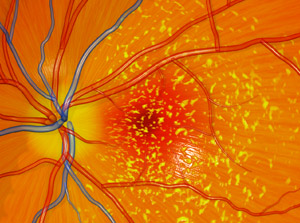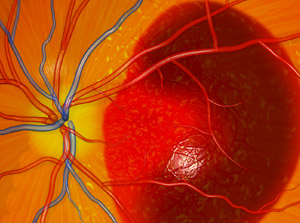Macular Degeneration
Macular degeneration is the breakdown or loss of function of the cells responsible for vision in the macula. The macula is the small, central area of the retina responsible for reading and seeing fine detail. It is the part of the retina used when one attempts to thread a needle or read the phone book. Macular degeneration does not affect the peripheral vision, however. Thus, even in the most severe cases, peripheral or “side” vision can remain essentially normal.

View Video:
Age-Related Macular Degeneration, Dry Type (Dry AMD)

View Video:
Age-Related Macular Degeneration, Wet Type (Wet AMD)
Causes
Degeneration of the macula is actually an extreme condition of the body’s normal aging process. Exactly why it becomes visually significant in some individuals and not in others is unknown, although there does appear to be some inheritance pattern. Deposits of drusen (a protein and lipid material) begin to accumulate in the macula and cause death of the light absorbing cells. If this continues without the formation of new blood vessels, it is called “dry” macular degeneration. If blood vessels form from the structure beneath the retina, it becomes the “wet” type of macular degeneration. Although both can cause severe vision loss, the wet form is less common and usually more problematic.
Symptoms
Macular degeneration can cause different symptoms in different people, ranging from no symptoms to severe central vision loss in both eyes. However, it is most commonly noted by a dark or empty area in the center of vision in one or both eyes, a distortion in straight lines or edges, or a blurring of words on a page.
Treatment
Unfortunately, no treatment has been uniformly effective. A recent scientific study showed the progression of moderate dry macular degeneration to advanced stages was slowed by the use of high-dose combination therapy. The therapy included vitamin C, vitamin E, beta carotene and zinc. There was no benefit for people with no or early macular degeneration. Macular surgery, laser, photodynamic therapy and thermal therapy have been attempted, but the results are only modestly effective and generally not encouraging to date.
It is important to remember that macular degeneration does not affect peripheral vision. Therefore, people with significant central vision loss still have useful vision from the sides. Often this is enough to continue with many of one’s favorite activities by using optical devices such as magnifiers, closed circuit televisions, large print reading material and computerized or talking devices. Macular degeneration is a significant cause of vision loss and blindness in the United States. It has no uniformly successful treatment, but early detection and supplementation can help one to continue many visually satisfying activities.
